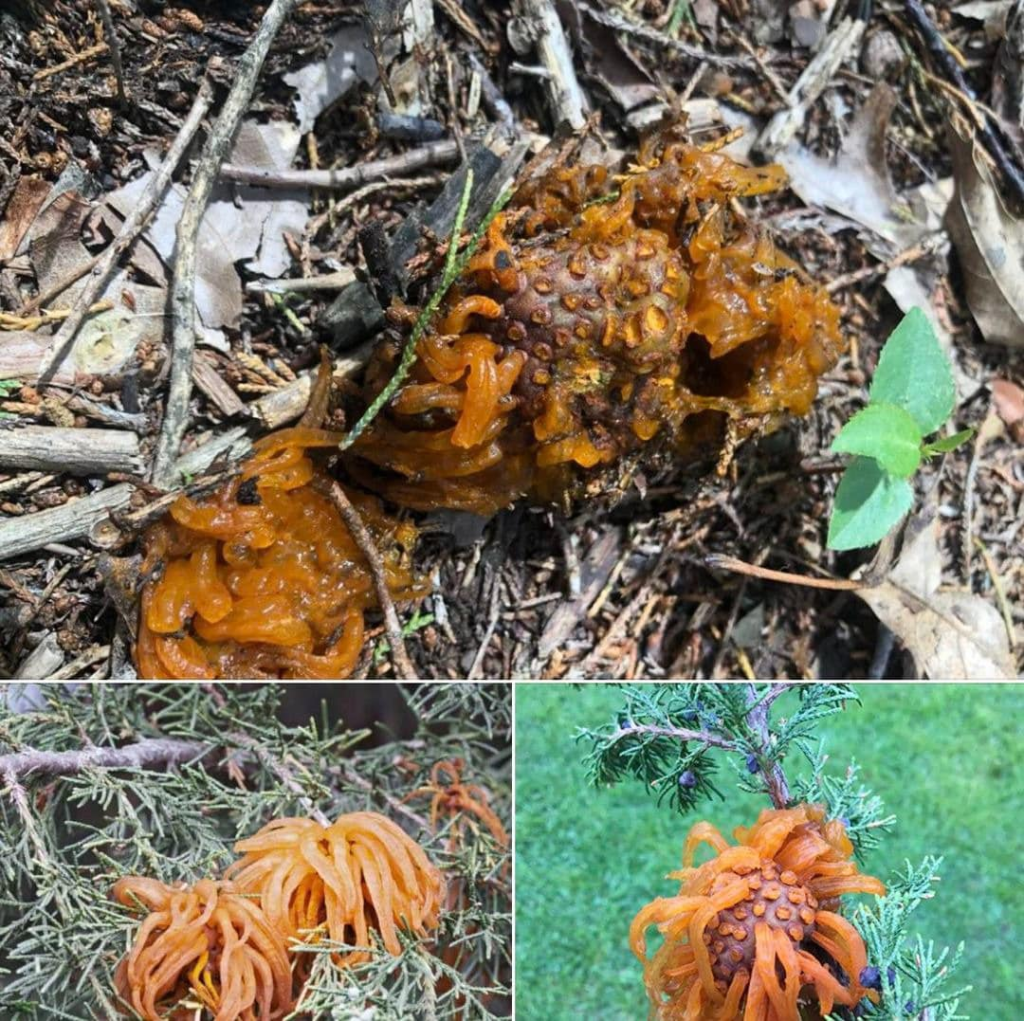
Taking good care of the plants in your backyard can bring you great satisfaction.On the other hand, it also offers a good deal of challenges. Occasionally, you could come upon strange things that leave you scratching your head. Recently, a Reddit user from Oklahoma found something unusual in their trees: a significant quantity of yellow jelly and what they referred to as a “jelly alien nut.” Confused and curious, they turned to the online community for answers.
This mysterious phenomenon was determined to be caused by cedar-apple rust. To complete its life cycle, it requires two hosts; apples and crabapples are the most common hosts. Although the name implies cedars are involved, juniper trees can also be affected.
How to Identify Apple-Cedar Rust
The symptoms of cedar-apple rust vary depending on the type of tree it infects. On the twigs of juniper bushes, brown, persistent galls may develop. When spring weather turns damp, these galls grow orange gelatinous horns. The juniper host is unaffected, however the twig farther away from the gall may die.
The leaves of apple or crabapple trees get circular yellow blemishes shortly after they bloom. As summer progresses, these lesions turn into brownish tufts of threads or cylindrical tubes. They are hidden beneath the blotches on leaves, twigs, and fruits.

Understanding Life Cycle
Now, you might be wondering how long this ailment lasts. Well, galls start to form seven months after the initial disease. After eighteen months, they turn into gelatinous lumps. The galls produce golf-ball-shaped depressions from which telial horns emerge the following spring. When it rains in the spring, the brownish telial horns spread out and become a vivid orange color. When they release their spores, the horns eventually droop, dry out, and fall off. After they die, the galls remain attached to the tree for as least a year. The infection is most noticeable in the spring when the galls are covered in gelatinous masses.
Managing Cedar-Apple Rust
Fortunately, there isn’t much of a treatment for this infection. Cut off the afflicted areas to prevent the illness from spreading. It’s crucial to keep in mind that cedar-apple rust won’t kill your trees—it will only damage the plants’ aesthetics. If you would rather be proactive, you can use fungicides or select apple cultivars that are resistant to this disease.
To sum up
In conclusion, even though you might not often see cedar-apple rust in your backyard, your trees are not in grave danger. It’s essential to comprehend this infection so that, in the event that it materializes, you can respond appropriately. Tell people about this information so they too can recognize and understand cedar-apple rust. I’m toasting to your productive gardening!
Things That Clog Your Pores And Cause Acne

Acne is a skin problem that affects about 90% of people during their life. There are many reasons why acne appears.
However, some things we might never have thought would cause acne actually do, and we might not even know it.
Viral Strange has collected 7 things that can cause pore-clogging and acne appearance.
Pores: We’ve all got these tiny openings in our skin for releasing sweat and oil, but for some people, they can be more temperamental than others. Or, rather, clogged pores happen more often to some of us than others. Clogged pores happen when oil doesn’t or can’t flow through them as it should, explains board-certified dermatologist Geeta Yadav, MD. “Typically, this is caused by the overproduction of oil that then becomes trapped by dead cells that haven’t properly shed from the lining of the pore. Makeup, dirt, and/or comedogenic ingredients can also block the pore, and prevent that flow of oil through it,” she says.
Comedogenic is essentially a word for pore-clogging, and while these types of ingredients aren’t the sole cause of acne and breakouts—there are several factors—they certainly won’t help the situation. “Pore-clogging ingredients make it much more likely that pimples will form,” says board-certified dermatologist Rachel Nazarian, MD. “In someone who has naturally oily skin or who harbors the bacteria that causes acne, using these ingredients is like adding gas to the fire. It’s a dangerous combination that can exacerbate acne and cause consistent breakouts.”
Coconut Oil
All three dermatologists we spoke with called out coconut oil as a common offender. “While it has a variety of health benefits, it’s highly comedogenic, especially when applied on the the face,” Palm explains. “Because it isn’t easily absorbed [into] the skin, it can trap bacteria and dead skin cells, making it detrimental for those who are acne-prone.”



Leave a Reply